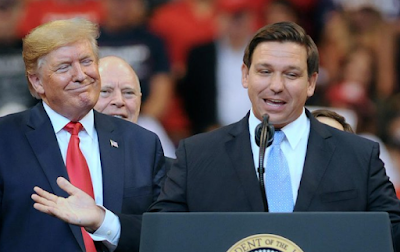Local candidates caught include MAGA Sen. Elaine Morgan, her opponent Jennifer Douglas and former state rep. Larry Valencia
 |
Richard Thornton, director of campaign finance for the
Rhode Island Board of Elections, is finding more mistakes on
reports filed by candidates more often.
(Michael Salerno/Rhode Island Current) |
Think of Richard Thornton like a financial detective.
As campaign finance director for the Rhode Island Board of Elections, Thornton devotes his days to combing through stacks of spending and fundraising reports for candidates, political action committees and ballot question advocacy groups, cross-checking those accounts with bank statements for potential errors or red flags.
And these days, he’s finding problems a lot more often.
Indeed, the $13,150 in fines candidates paid to the election board in 2022 for campaign finance mistakes (not counting late fees) is more than triple the amount paid the year prior, according to data obtained by Rhode Island Current. With another $5,000 in finance violations paid through July of this year, 2023 is also poised to show a larger increase than in years past.
At face value, this might be cause for alarm. But Thornton sees it as a good thing; it means his three-person team is getting better at sniffing out rulebreakers.
“Our focus has really shifted through the years,” Thornton said. “We have these additional tools which have expanded our role, and we’ve seen a lot of success in that approach.”
The turning point came in 2015, with a trio of bills signed into law by then-Gov. Gina Raimondo that strengthened campaign finance rules and reporting requirements.
John Marion, executive director for Common Cause Rhode Island, describes the bevy of law changes as the “post-Gordon Fox reform,” referring to the former Rhode Island House Speaker who was sentenced to three years in federal prison in 2015 after pleading guilty to bribery, wire fraud and tax evasion.
“I think the number 1 reason you’re seeing more violations is thanks to the post-Gordon Fox reforms, which make it easier for the Board of Elections to spot when there is a violation,” Marion said. “It may look like more people are cheating, but the reality is, people may have been cheating all along, we’re just catching them more.”
Among the bills passed in the wake of the Fox scandal: requiring candidates and political action committees to turn over quarterly bank account statements in addition to their separate accounts of fundraising and spending.
Other laws passed as part of the package of campaign finance reforms require candidates, officeholders and political action committees to keep their campaign accounts separate, and to appoint a treasurer other than themselves if they raise or spend more than $10,000 in a year.
The bank statement law, in particular, was a “gamechanger,” Thornton said.
Comparing a bank statement with a campaign finance report allowed his staff to find “variances,” which in turn, often revealed larger problems with a candidate or committee’s finances.
Also crucial: the almighty subpoena, which the elections board has always had authority to use but has turned to increasingly in recent years if a candidate or committee isn’t willingly turning over their financial information, Thornton said.
While the changes to state campaign finance law went into effect in 2016, the results of those changes took longer to realize. Hence, the increase in fines from campaign finance violations starting in 2021, according to Thornton.
A few of those violations suggest glaring and intentional rule breaking, but more often, Thornton described the violations as inadvertent or accidental errors.
Take Sen. Elaine Morgan. The Hopkinton Republican was among the nine people who entered into consent orders with the election board in 2022 for campaign finance violations. Morgan, who has served in the Rhode Island Senate since 2014, paid a $1,200 fine after she was found to have spent more than $2,600 of campaign funds on personal expenses during the two prior years, according to the election board audit.
Morgan readily admitted to the mistake, which she chalked up to “accidental stupidity.”
She had wrongly thought her campaign debit card was her personal one, since both were marked with her name and from the same bank, Washington Trust Co., she said.
While she characterized her violation as inadvertent, she also stressed the importance of candidates following the rules.
“If we’re going to take money, we have to know the rules,” she said.
Which, based on Thornton’s efforts, they should.







.webp)





:max_bytes(150000):strip_icc():format(webp)/buyback.asp-Final-5a1ff1b0e4294d8293b5b3a044417e70.jpg)








